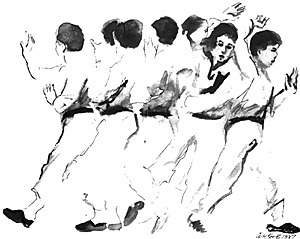
A fairly common method of MechWarrior training used throughout the Successor States today is the practice of apprenticeship, in which young candidates for a Warrior's position are taken in as part of a military household and given long and extensive training while acting as laborers or servants to the unit. The practice is particularly common in mercenary outfits and among aristocratic Warrior families and is the usual route by which children may succeed their parents in a family-owned 'Mech that might go back for generations,
The concept of apprenticeship in the warlike arts is almost certainly as old as the history of War itself, but it probably first achieved a degree of legitimacy in the days of Terra's Roman Empire. Once the Imperial legions became tied to specific frontier provinces, it was common practice for villages to spring up near a legionary camp and for the children of the village-- many of them born to soldiers and their local wives--to join the Legion at an early age and grow up as part of the unit with all of its traditions and legacies. It is likely that this practice was the source of the use of squires by Medieval knights (who were the direct heirs of the legionary heritage once the Roman units became cavalry, rather than infantry, formations) after the fall of the Empire and the rise of feudal Europe.
As professional armies became the rule, the concept of apprentice soldiers began to die out; the last true holdouts in the practice were in the navies of the 19th Century, where midshipmen went to sea at an early age and became apprentice officers mastering their craft while actually serving in combat. The Napoleonic concept of professional armies, and especially the Prussian reserve system which demanded universal formal military training among a nation's citizenry, tended to put an end to the more elitist notions of apprenticeship.
It was the revival of feudalism intheeraof the BattleMech that brought the system back into prominence. Because a 'Mech is a scant resource that may be passed as a legacy from one generation to the next within a Warrior famlly, training in the use of that 'Mech is often very much a family affair. In similar fashion, ongoing manpower shortages in mercenary units and local military forces (as opposed to the more formally constituted House armies) often make it expedient to take in the very young and put them through a long-term training program. These youthful students earn their keep by helping technicians, acting as servants to the unit's fighting men, and serving as messengers, porters, cooks, bottlewashers, and anything else they are needed for.
Apprenticeship programs vary in quality according to the resources available for training. A very poor program will simply teach basic military concepts, physical training, and some mental discipline, with infrequent practice in actual 'Mech operation. The presence of specialist tutors, simulators, and other instructional aids can make apprenticeship at least as worthwhile as any academy program. Some particularly good merc units and aristocratic families have turned out Warriors superior to anything the NAIS has produced. Grayson Death Carlyle, founder of the Gray Death Legion and one of the most notable young mercenary leaders on the scene today, was trained as an apprentice to his father using the resources of a fairly small but well-run unit.
The primary advantage to an apprentice training program is the length of time it generally runs. Candidates are taken in young, sometimes as early as 8 or 10 years old, and may not actually take over a 'Mech until they are in their twenties. With a decade of physical training, simulator experience, and exposure to the art of war, the candidate cannot help but be in superb physical, mental, and academic condition by the time he or she becomes a Warrior. However, apprenticeship is a very conservative form of training; it tends to perpetuate certain approaches to warfare from one generation to the next. It is also highly variable in quality from one place to another; it is often a matterof luck that determines whether ten years of fetching and carrying will pay off in exceptional training or lead to an academic dead end.
MechWarriors: More Than Ordinary Training: MechWarrior Mind and Machine
Back to BattleTechnology Table of Contents
Back to BattleTechnology List of Issues
Back to MagWeb Magazine List
© Copyright 1987 by Pacific Rim Publishing.
This article appears in MagWeb (Magazine Web) on the Internet World Wide Web.
Other military history articles and gaming articles are available at http://www.magweb.com